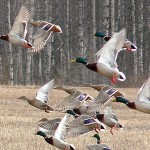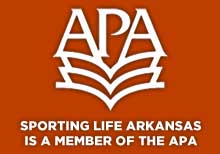This story is part of an ongoing series of stories that first appeared in Arkansas Wild, published by Arkansas Times, Inc., and is available on newsstands in Central Arkansas. You can order your FREE copy of the next issue of Arkansas Wild as an ebook from Sporting Life Arkansas today. We expect the issue to be ready by the end of February, and we will deliver it to you via email. To order, click here or on the Arkansas Wild icon within this story.
By Erica Sweeney
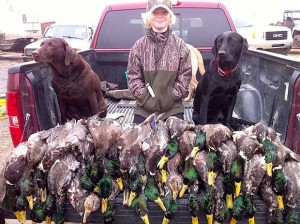 Arkansas duck call makers have fine-tuned their instruments to produce the highest quality call for hunters all over the world. Each manufacturer, no matter how big or small, has its own unique history and strives to carry on the state’s rich duck hunting tradition so that it is passed along to the next generation.
Arkansas duck call makers have fine-tuned their instruments to produce the highest quality call for hunters all over the world. Each manufacturer, no matter how big or small, has its own unique history and strives to carry on the state’s rich duck hunting tradition so that it is passed along to the next generation.
“A duck call is truly a musical instrument,” says Bob Migeot, owner of Mojo Duck Calls, a “one-man” operation based in Maumelle.
Migeot, a California native, started making calls in 1980 after a neighbor took him duck hunting for the first time.
“It was all I needed to see,” he said. “I bought a $10 duck call but couldn’t make it sound like a duck.”
So, Migeot decided to make his own call, and says he was inspired by Arkansas call-maker Andy Bowles. Migeot says he tried to duplicate a call Bowles made for him “using a hand drill and piece of walnut.” At first, Migeot made calls for himself, and then made them for others. Instead of selling his calls, he says he bartered them for hunting equipment.
“As a new hunter, I didn’t have a lot of equipment, and bartering worked pretty well,” he says.
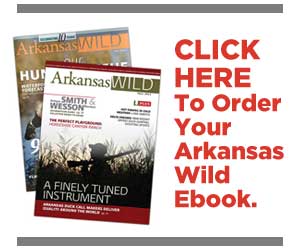 Migeot made more and more calls, and eventually sold them in stores. His mission was always to remain small: “It’s not fun when it’s a major business. It loses the personal touch,” he says.
Migeot made more and more calls, and eventually sold them in stores. His mission was always to remain small: “It’s not fun when it’s a major business. It loses the personal touch,” he says.
Now, Migeot sells his calls mostly at Ducks Unlimited dinners, by word of mouth and retailers such as McSwain Sports Center in North Little Rock and Fort Thompson Sporting Goods in Sherwood. At 73, he says his eyesight is failing, but since he can put together a duck call by rote, he’s planning to continue making them for as long as he can.
Rick Dunn, owner of Echo Calls in Beebe, began making calls as a hobby in 1975 and gave away the first two he made. But his third call was “really good,” and he says he didn’t want to give it away. When someone offered him $40 for it, he accepted, and it just “took off from there,” he says. Dunn continued making calls part time until 1996, when he became a full-time duck call maker.
“I had no idea when I started that a hobby would snowball and now it’s hard to keep up,” Dunn says.
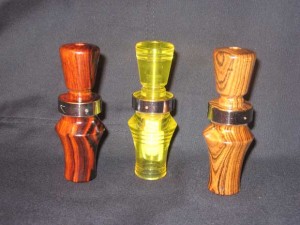 Echo has now outgrown its shop, and plans to move to a larger location at the beginning of next year, Dunn says. He says he hopes Echo continues to grow, but at age 61, he “doesn’t want to keep working so hard,” and plans to train someone to handle the day-to-day operations so he can just supervise.
Echo has now outgrown its shop, and plans to move to a larger location at the beginning of next year, Dunn says. He says he hopes Echo continues to grow, but at age 61, he “doesn’t want to keep working so hard,” and plans to train someone to handle the day-to-day operations so he can just supervise.
One of the state’s newest duck call manufacturers, Black Ops Duck Calls, started in 2009. Owner Mike Fleeman wanted to make new versions of the P.S. Olt, an older duck call that had been out of production for several years. After a friend paid about $100 for an out-of-production Olt call on ebay and it arrived broken, Fleeman says it “sparked” his idea for the company. Now, he can’t make calls fast enough, he says.
In 1976, Butch Richenback founded Rich-N-Tone right in the heart of Stuttgart, often called the duck hunting capital of the world. Richenback learned to make duck calls from Dixie Mallard call-maker Chick Majors, but didn’t start selling his own calls until Majors died, says Jim Ronquest, RNT’s “PR guy” and producer of RNT-V.
Rich-N-Tone first made only one type of call, which could be adapted to meet individual needs. “At the time, there was no tone board like it,” Richenback says, and the design was unique. He says he modeled the call’s lip on a Coke bottle.
Richenback says he intended to make duck calls as a hobby, but it steadily grew until he couldn’t keep up with demand. “I went from small time to big time,” he says.
In 1999, John Stephens purchased the company and it became RNT, now the biggest custom call manufacturer in the state, maybe the nation, Ronquest says.
Homegrown Duck Calls
Because duck hunting is so entrenched in the state’s culture, Ronquest says Arkansas hunters often enjoy buying a homegrown product. “I like to think our homeboys have our backs,” he says.
“Stuttgart is the duck capital of the world,” Dunn says. “Arkansas is the mecca for duck hunters. People come from all over the world to hunt here. Calls made in Arkansas suit our needs a little better than calls made in other parts of the country. Hunters try to support us because we’re from around here.”
“Arkansas duck calls sound more like a duck than others. That’s why Arkansas duck calls are being duplicated in other parts of the country,” Migeot says.
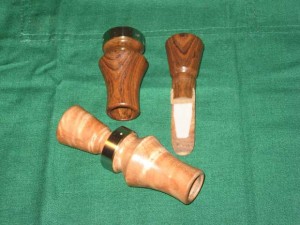 Each duck call made in the state has its own unique look and sound, and makers are quick to point out what sets theirs apart from the others.
Each duck call made in the state has its own unique look and sound, and makers are quick to point out what sets theirs apart from the others.
“We have a passion for waterfowling, and strive to build the best-sounding call,” Ronquest says. “A little friendly competition and rivalry goes a long way in building a better product.”
“We’re the guy everyone chases,” Richenback says. “But no one could ever catch us.”
RNT has a team of 14 and manufactures 13 different duck call models and six Canada goose models, and the company’s Quackhead line includes eight duck and three goose calls. RNT calls are made of wood, acrylics and molded polycarbonate, Ronquest says. They are sold online (www.rntcalls.com), as well as at Mack’s Prairie Wings, Bass Pro Shops, Cabela’s and more.
Most RNT calls are Arkansas style, which has a straight reed on a curved surface, Ronquest says. Another common type of call is Louisiana style with a floating wedge design, he says.
Ronquest says RNT provides many different models to match people’s needs. And, Richenback is always available to make adjustments so calls can be even more individualized.
“The hard part is trying to find the middle ground that fits most everybody,” Ronquest says. “The good news is, if it is not right for you out of the box, we will make it right as long as you give us a chance.”
Migeot makes two types of calls – one made of wood and one made of Tenite, a soft plastic material. Migeot says Mojo calls “stick” less than others, meaning that when saliva gets trapped inside the call, the reed can stick to the soundboard. His calls also have a “good low end, good high end and good middle end. Most don’t have all three,” he says.
“Some people try to do things cheaper,” Dunn says. “I don’t think duck hunters are looking for the cheapest. They want something that will last. We always try to make a good product. We’re very particular on quality. We think ours is the best. We have the best wood finish, the shiniest acrylics, best sound.”
Echo has a staff of eight and makes 12 different varieties, both single and double reed, using wood, acrylics and polycarbonate, Dunn says. He says all raw materials are American-made, and calls are made in Beebe.
Echo calls are sold via their website (www.echocalls.com) and at large and small retailers, like Mack’s, Gander Mountain and others.
Based in Benton, Black Ops makes two types of calls, the 50-11, a Louisiana-style call, and the DFB (Death from Below), an Arkansas-style call. Black Ops calls are made out of a material that Fleeman developed, which is a cross between rubber and plastic, and similar to Bakelite, the original P.S. Olt material. Fleeman, along with his dad, Dennis, and best friend, Jarrod Hambric, hand make each call.
Fleeman says Black Ops calls are best suited for hunting in the woods and on public land, and are much different from other calls made in the state.
“Ours don’t look like regular duck calls or sound like them,” Fleeman says. “Our calls are loud, raspy and coarse. We’re more aggressive and out of the box than traditional call makers.”
Black Ops calls are sold online (www.blackopsduckcalls.com) and at Turbyfill Outdoors in Benton.
Quality is most important to all duck-call makers. Ronquest says RNT constantly strives for perfection: “Each call is hand tuned and blown before it leaves the shop.” Each Echo call is tested before it distribution, Dunn says, and “if it doesn’t measure up, we don’t send it.”
Dunn and the others say it’s important to regularly come out with new products. Ronquest says RNT came out with three new calls last year. Black Ops plans to debut a new call soon, Fleeman says.
For Hunters, By Hunters
Being a hunter is first and foremost for duck-call makers, and, “if it’s not one we would use, it doesn’t go out,” Fleeman says.
“We’re hunters first, and we’ve won more world titles than anyone in the country,” says Ronquest, who estimates that more than 80 world titles have been won using RNT products, and several RNT staff members have won titles.
Richenback, a member of the Arkansas Outdoor Hall of Fame, won the World Champion Duck Calling title in 1972 and the Champion of Champions in 1975. In early October, he received the Ducks Unlimited 8th Annual Jerry Jones Sportsman’s Award. RNT President John Stephens has won world calling titles in 1995, 1998 and 2005.
At the Wings over the Prairie Festival in Stuttgart in November, Echo will have a booth and several World Championship competitors will use their calls. Dunn says several world titles have been won using Echo calls.
Hunters can have the best duck call in the world, but “you have to know what you’re doing,” Migeot says. Hunters must understand when and how to use a call, he says.
“Once you can call, hunting changes forever,” says Migeot, who goes duck hunting two to three times a week during the season. “It’s fun to watch ducks respond to what you say to them. It’s a pretty sight seeing them cup their wings and come into the decoys.”
Arkansas duck call makers offer many resources to help hunters learn to use their calls. Dunn holds a free training session at his shop in Beebe on Tuesday nights to teach people how to use Echo calls. He says 25 to 35 usually attend.
Fleeman has several YouTube instructional videos and often teaches people how to use his calls over the phone.
In its seventh season, RNT-V, broadcast on the Sportsman Channel, “shows folks our vision on duck hunting,” says Ronquest. It also shows off RNT products, he says.
“One of the perks is a lot of time in the field with a camera,” he says, adding that RNT-V produces 13 shows a year, which air twice covering a total of 26 weeks.
RNT also works with Ducks Unlimited and Delta Waterfowl in habitat management and other conservation efforts, Ronquest says.
“Whether it’s a lifestyle, passion or occupation, if you take care of waterfowl, it will always be there for your kids and grandkids to enjoy,” he says.
Teaching kids to use duck calls and getting them interested in duck hunting is essential in keeping the industry alive for future generations, says Richenback, who holds a kids calling clinic each year during the duck festival and teaches anyone who needs help. Dunn also teaches kids the art of duck calling through Green Wings and Ducks Unlimited.
Besides the sense of accomplishment, Dunn says, the best part of being in the duck-call business is going hunting every day. “I’m glad to be part of something we really like to do. That’s what makes it worthwhile,” he says.
Fleeman says, “it’s nice to hunt with something you’ve made,” and seeing others use his calls is an “awesome feeling.”


